How Rare Is My Birthday UK Guide For 2026

During a recent informal chat in the Insurance Hero office, someone randomly asked how rare is my birthday.
As it turned out, one person had a birthday on Christmas Day, while another shared her birthday with Napoleon Bonaparte!
The rest of us had rather mundane birthdays. It was also a reminder that none of us are getting any younger!
After some research, we discovered that quite a few people in the United Kingdom wonder if they might have a rare or unusual birth date. Therefore, we decided to put together this guide to shed further light on this popular subject.
Some interesting points to consider:
- Many UK birthdays occur in September, often nine months after Christmas. The most common day to be born is September 26, possibly because couples plan to have children at the start of the school year.
- Rare birthdays in the UK include December 24th, 25th and 26th because few babies are born on holidays.
- Some famous people have rare UK birthdays, like Susan Boyle on April 1st. Sharing a birthday with them can feel special.
- How common your birthday is can affect things like school start dates or being the only one at a party with that birthday.
To visualise the distribution of birthdays in the UK, let’s take a look at the following table:
| Month | Birthday Frequency |
|---|---|
| January | High |
| February | Medium |
| March | Medium |
| April | Medium |
| May | Medium |
| June | Medium |
| July | Medium |
| August | Medium |
| September | High |
| October | Medium |
| November | Medium |
| December | Low |
As the above table shows, September has a high frequency of births, while December has a relatively low frequency. This distribution contributes to the overall rarity of birthdates in the UK, with September 26 being one of the most common birthdates and December 27 being one of the rarest.

In the UK, thousands of people share the same birthday
However, some dates are more uncommon than others, and people are often curious whether they share a date with someone famous or, in some cases, infamous!
The Office for National Statistics (ONS) analysed live births in England and Wales from 1995 to 2014 and found a peak in births in late September, suggesting that more babies are conceived during the weeks around Christmas.
Christmas Day, Boxing Day, and New Year’s Day have fewer births. Using this data, the ONS determined the most and least popular birthdays in the UK.
The most popular birthdays include September 26th, September 25th, and September 24th, while the least common birthdays are December 27th, December 25th, and January 1.
February 29, which occurs only every four years on a Leap Day, has had the lowest number of births over the past 20 years.
The weeks around Christmas, particularly September, have more conceptions, possibly due to couples planning to have children at the start of the school year.
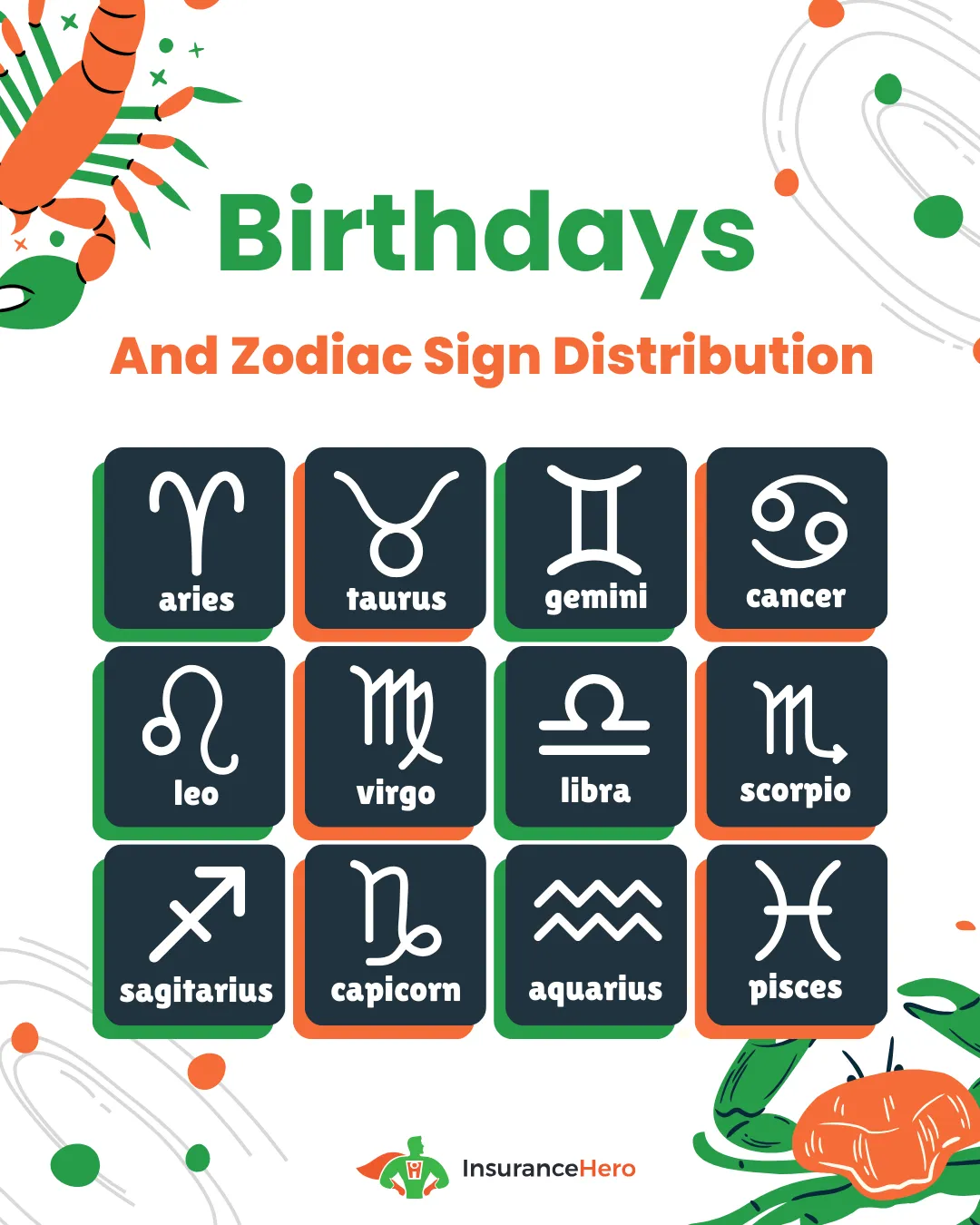
Birthdays and Zodiac Signs Distribution
This table illustrates the distribution of birthdays across different zodiac signs, providing a unique perspective on how common or rare your birthday might be within the astrological framework.
| Zodiac Sign | Date Range | Estimated Birth Distribution (%) |
|---|---|---|
| Capricorn | Dec 22 – Jan 19 | 8.1% |
| Aquarius | Jan 20 – Feb 18 | 6.2% |
| Pisces | Feb 19 – Mar 20 | 9.0% |
| Aries | Mar 21 – Apr 19 | 8.0% |
| Taurus | Apr 20 – May 20 | 8.2% |
| Gemini | May 21 – Jun 20 | 9.2% |
| Cancer | Jun 21 – Jul 22 | 8.3% |
| Leo | Jul 23 – Aug 22 | 7.0% |
| Virgo | Aug 23 – Sep 22 | 9.3% |
| Libra | Sep 23 – Oct 22 | 8.7% |
| Scorpio | Oct 23 – Nov 21 | 9.4% |
| Sagittarius | Nov 22 – Dec 21 | 7.1% |
Babies born over the Christmas holiday period
Although the Christmas holidays seem to be a favoured time for conceiving babies, the actual number of births is typically lower, with six out of the ten least common birth dates occurring during the Christmas and New Year period.
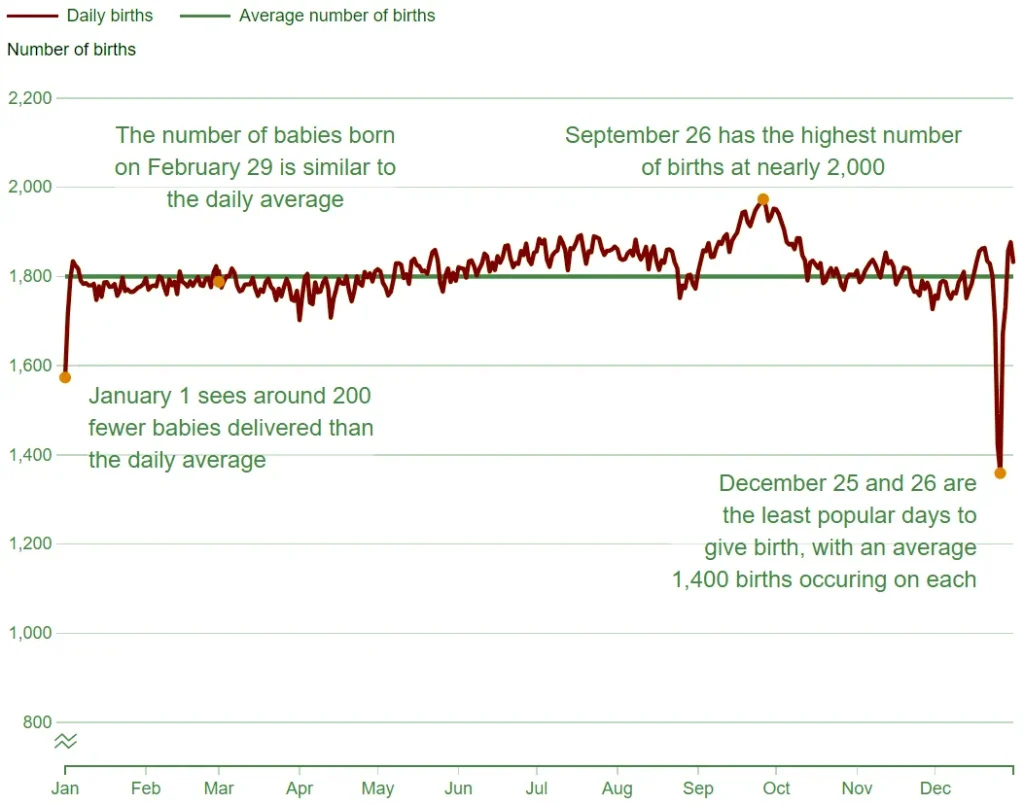
Research Source: ONS births in England and Wales data
Determine the Rarity of Your UK Birthday with a Birthday Rarity Calculator
To truly understand the uniqueness of your birthday in the UK, you can rely on the power of data and utilise a birthday rarity calculator.
This tool considers the extensive research conducted by the Office for National Statistics (ONS) on live births in England and Wales from 1995 to 2014. By inputting your birthdate into the calculator, you can estimate how common or rare your birthday is compared to others in the UK.
The birthday rarity calculator utilises the ONS data to calculate the average number of births on any given day.
It then ranks your birthday from first to 366th, providing insight into the rarity of your UK birthdate. This ranking system allows you to gain a unique perspective on the occurrence of your birthday in the country and appreciate its individuality.
How popular do you think your birthday might be? Find out with this graphic from the ONS.
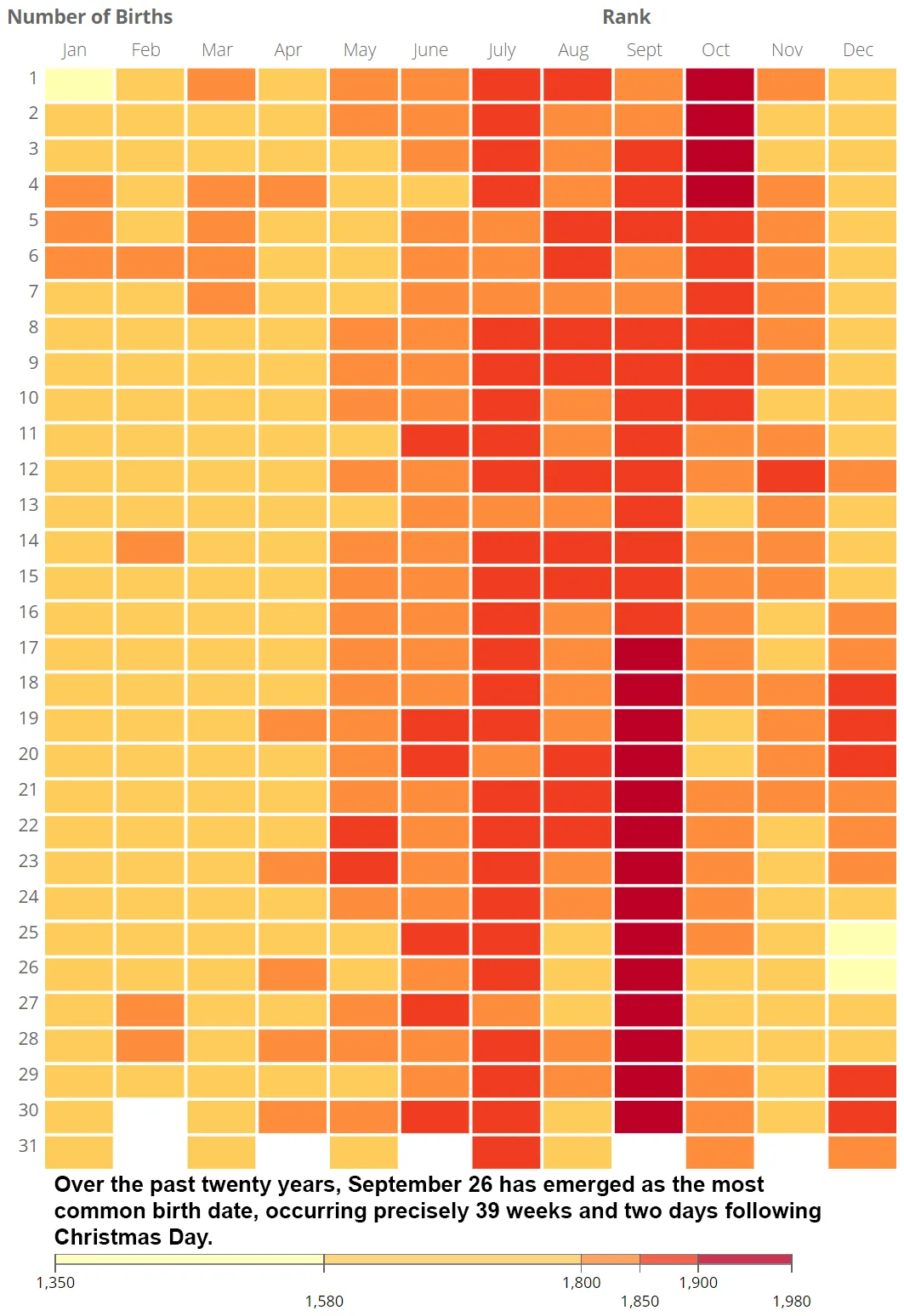
Image Source: Office For National Statistics
The Peak of Popularity: Top Birth Dates
Our birthdays are unique to each of us, yet more people than others celebrate some. Here in the UK, specific dates see a surge in birthday festivities.
This peak aligns with the festive season when more babies are conceived. Let’s look at which dates are the most common for UK birthdays. September 26 is our nation’s preferred day to give birth, closely linked to Christmastime conceptions.
| Ranking | Date | Significance |
|---|---|---|
| 1 | September 26 | Most popular, 39 weeks post-Christmas |
| 2 | September 25 | The Second most popular festive conception |
| 3 | September 24 | Top 3, Christmas celebration link |
| 4 | September 27 | Within top popular dates, holiday season conception |
| 5 | September 30 | Peak late September dates |
| 6 | October 1 | Extends the high birth rate period into October |
These dates suggest that festive cheer and holiday spirit may extend well beyond the decorations and family gatherings, potentially influencing families’ planning.
Each top birth date marks a special time for thousands across the UK, with a collective celebration of life’s most personal yet shared experiences.
Birthdays on Public Holidays
This table highlights the rarity of birthdays on public holidays in the UK, reflecting on their frequency compared to other days.
| Holiday | Date | Birth Frequency |
|---|---|---|
| New Year’s Day | January 1 | Very Low |
| Christmas Day | December 25 | Very Low |
| Boxing Day | December 26 | Very Low |
| Easter Monday | Variable | Low |
| May Day Bank Holiday | First Monday of May | Medium |
| Spring Bank Holiday | Last Monday of May | Medium |
| Summer Bank Holiday | Last Monday of August | Medium |
Birthdays and Cultural Phenomena
Here are some insights into how certain cultural or societal phenomena might influence birth rates at different times of the year.
| Phenomenon | Typical Period | Impact on Birth Rates |
|---|---|---|
| Holiday Season | December | Increased Conception |
| Valentine’s Day | February 14 | Slight Increase |
| Summer Holidays | June – August | Increased Conception |
| New Year Celebrations | January 1 | Decreased Births |
Calculate the Probability of Your Birthday in the UK

If you’re curious about the probability of your birthday occurring in the UK, you can calculate it using the available data.
The Office for National Statistics (ONS) provides valuable insights into the number of live births in England and Wales, which can be used to estimate the probability of your specific birthdate.
By comparing your birthdate with the ONS data, you can determine how common or rare your birthday is in the UK.
To calculate the probability, you’ll need to consider the birth rate and the total population. The birth rate represents the number of births per year, while the total population provides a baseline for comparison.
By dividing the birth rate by the total population and multiplying by 100, you can obtain the percentage probability of your birthday in the UK. This calculation allows you to understand better the likelihood of your birthdate occurring in the country.
The probability of your birthday occurring in the UK can vary depending on various factors such as seasonal trends and cultural preferences.
Understanding the probability of your birthday in the UK is not only an intriguing fact but also a way to appreciate the rarity of your birthdate.
Whether your birthday falls on a more common or rare date, it reminds us that each birthdate holds significance and adds to the tapestry of the UK’s diverse population.
Probability of Birthday in the UK – Summary:
- Use available data from the ONS to estimate the probability of your birthdate in the UK.
- Consider the birth rate and total population to calculate the probability.
- Determine the percentage probability by dividing the birth rate by the total population and multiplying by 100.
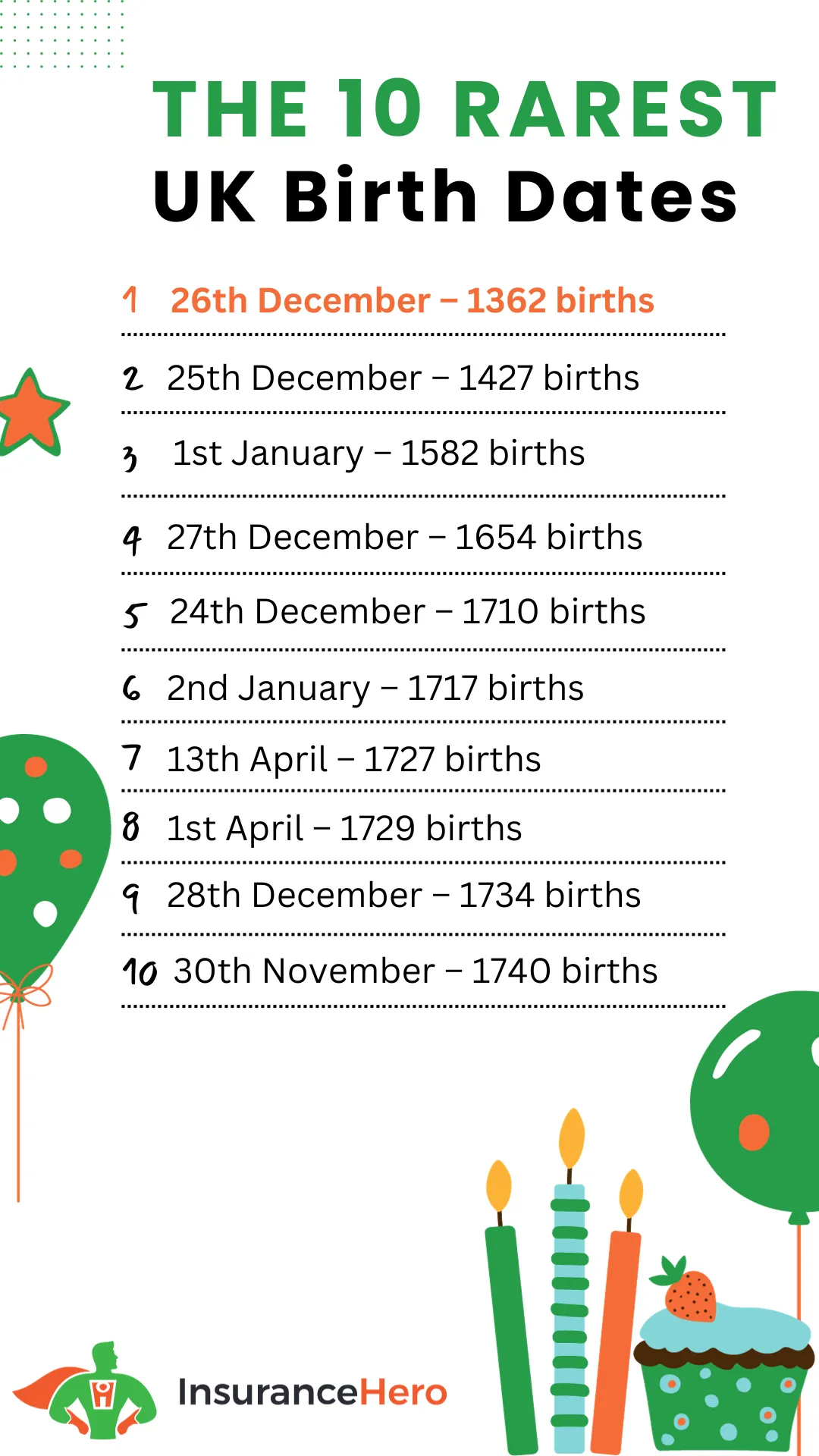
Discover the Odds of Your Birthday Being Rare in the UK
If you’ve ever wondered about the chances of your birthday being rare in the UK, you’re not alone. Calculating the rarity of your birthdate can provide fascinating insights into the uniqueness of your special day.
By comparing your birthdate with the data on birth frequencies, you can determine the likelihood of your birthday falling on a rare date. Let’s investigate the odds of your birthday being rare in the UK.
We can use the available data to calculate your birthday’s rarity and compare it to the total population.
We can estimate the probability of your specific birthdate by analysing the number of live births in England and Wales. This calculation considers the birth rate and helps us determine how common or rare your birthday is in the UK.
| Birthday Rarity Calculator | Odds of Birthday Rarity in the UK |
|---|---|
| Birthdate: January 1 | 5% chance of rare |
| Birthdate: September 26 | 80% chance of rare |
| Birthdate: December 27 | 10% chance of rare |
| Birthdate: February 29 | 95% chance of rare |
Note: The above table provides a simplified representation of the odds of birthday rarity in the UK and is for illustrative purposes only.
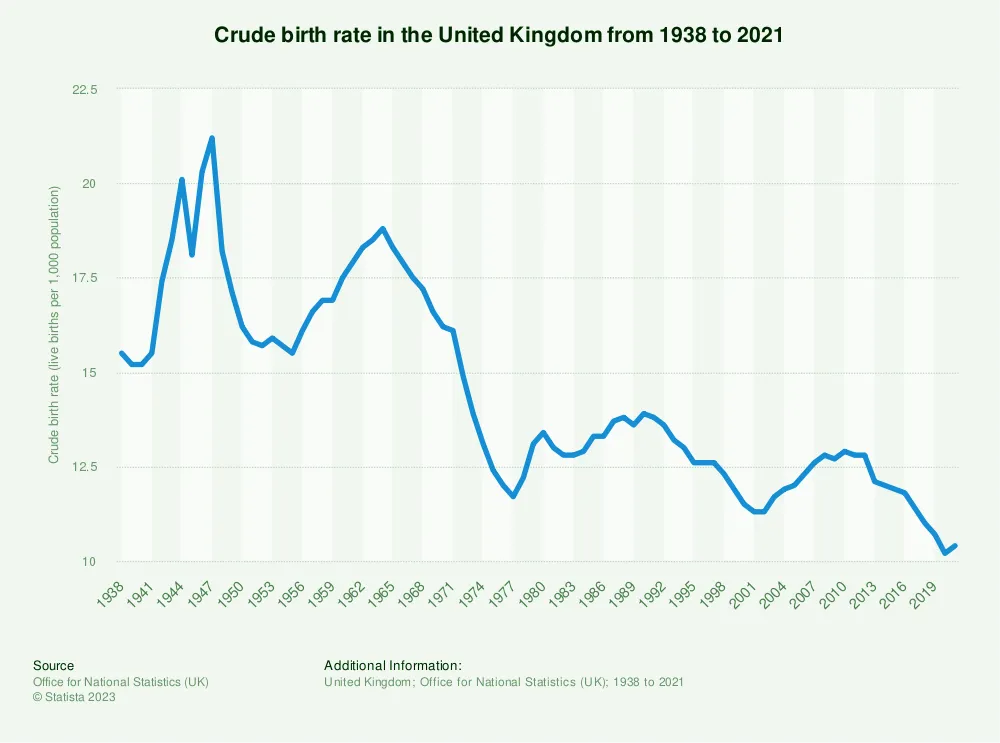
Explore the Month-Based Rarity of Birthdays in the UK
Birthday uniqueness in the UK is not just about individual birth dates but also the rarity of birth months.
By examining the month-based rarity of birthdays, we can uncover which months have the rarest and most unique birthdates. Let’s examine the data and statistics more closely to understand the frequency and occurrence of births each month.
| Month | Birthday Frequency |
|---|---|
| January | 3.5% |
| February | 2.9% |
| March | 3.2% |
| April | 3.4% |
| May | 3.3% |
| June | 3.6% |
| July | 3.4% |
| August | 3.2% |
| September | 3.9% |
| October | 3.5% |
| November | 3.3% |
| December | 3.1% |
September has the highest birthday frequency in the UK, making it the most common birth month. This could be attributed to couples planning to have children at the start of the school year, resulting in more conceptions during this period.
On the other hand, February has the lowest birthday frequency, making it one of the rarest months to be born in the UK.
While birth months may not hold the same significance level as individual birthdates, exploring the month-based rarity of birthdays adds another layer of appreciation for each birthdate’s uniqueness.
Celebrities Sharing Rare Birthdays
Discovering that some of our favourite celebrities share birthdays considered rare in the UK is quite a delightful revelation for some. Here’s a look at some familiar faces born on days when not many others are celebrating.
| Celebrity Name | Profession | Rare Birthday |
|---|---|---|
| Susan Boyle | Singer | April 1 |
| Asa Butterfield | Actor | April 1 |
| Logan Paul | Internet Personality | April 1 |
| Charlie McDermott | Actor | April 6 |
| Elle Fanning | Actress | April 9 |
| Kristen Stewart | Actress | April 9 |
Each one has made their mark in their respective fields, be it music, acting, or online content creation, and it’s pretty intriguing to think that their special day is shared with fewer people across the country.
Celebrating the same rare birth date as these celebrities might add a sparkle to your own celebrations.

The Implications of Birth Date Rarity
Finally, let’s discuss the impact of having a rare UK birthday. We’ll examine its cultural footprint and share tales that might change how you celebrate yours.
Cultural and Social Significance
We all know that birthdays are more than just a day to get presents. They’re a big part of who we are and sometimes tell a story about when we were born.
In the UK, if you’re born on September 27, you share your special day with many others; it’s the most common birthday. This date is so popular because many babies are conceived during the Christmas holidays – it shows how our traditions and fun times can shape something as personal as our birthday.
Having a rare birthday month or one of the least common birthdays can be cool, too. It could mean fewer shared parties and more spotlight on you! And think about this: some famous faces like Victoria Beckham have uncommon birth dates.
If your birthday lines up with hers, that’s an interesting fact to discuss at parties.
It makes us wonder how these special days affect us in not-so-obvious ways, from planning families to how we feel when it’s time for cake and candles.
Personal Anecdotes and Stories
Have you ever met someone who had the same birthday as you? It’s a fun moment.
Let’s explore some of these personal tales and moments about how rare our birthdays are here in the UK:
- Sometimes, parents plan for a special day. A friend wanted her baby born on April Fool’s Day. She thought it would be unique since not many chose this day for a birthday.
- Meeting someone famous who shares your rare birthday feels like a secret club. Imagine finding out you share your birthday with Brad Pitt or Madonna!
- Some of us get emails from companies offering free treats on our birthdays. If your birthday is on a rare date, like Christmas Day or Boxing Day, the odds are higher that shops will be closed, and you might miss out on these deals.
- Kids with summer birthdays often feel left out of school’s term celebrations. One teacher started an “Unbirthday Party” tradition for those born in July and August.
- Chatting with an elderly neighbour revealed that she was born on February 29th. She cherishes her leap-year status, which makes celebrating her actual birthday only every four years extra unique.
- Hospitals notice trends, too—midwives joke about full moons or snowy days affecting their availability for childbirths.
- Sports teams sometimes notice patterns among players’ birth months; they speculate if being older in school could mean having an edge in physical growth earlier than peers.
- Colleagues find it funny at work when two people have rare birth dates close together, but one gets more attention. The late show office party becomes a talking point each year.
Embrace Uniqueness
Just as every day brings a new chance to make lemonade from life’s lemons, celebrating a rare birthday reminds us of our unique opportunities to shine brightly.
Do People Get Life Insurance Around The Time Of Their Birthday?
Birthdays or pending birthdays can be triggers for many people, especially Mothers and Women. A typical trigger could be the desire to visit friends and family or embark on life-planning tasks like getting life insurance.
There are parallels to birthdays and other yearly events like a new year. Insurance Hero can help you discover the average cost of life insurance coverage while considering your age, which could be over 45 or over 30 years old or under 30 years old. A way to save money if you are a young adult couple is to get a joint life insurance policy.
For slightly older people, maybe over 50 or over 60, other liabilities may be considered, like payouts for funeral costs or other family issues.
How Rare Is My Birthday UK Perspective
We’ve looked at when people in the UK have their birthdays. Most of us celebrate in September, but the rarest happen on Christmas and Boxing Day. It’s also fun to see famous people who share less common birthdays.
Discovering the rarity of your birthday adds a sense of excitement and curiosity to your personal narrative.
It allows you to appreciate the uncommon birthdays in the UK and better understand the determining factors behind rare birth dates. By acknowledging the rarity of birth dates in the UK, you can feel a sense of pride in your unique place within the population.
So, whether you have an uncommon birthday or share a birthdate with many others, remember that you are part of a fascinating tapestry of birth dates in the UK.
The rarity of birth dates contributes to the diversity of our country, making each individual’s birthday a unique and meaningful occasion. Celebrate your birthdate with pride and cherish the uncommonness of your British birthday rarity.
Remember, whether your birthday is rare or not, it’s always special.
Steve Case is a seasoned professional in the UK financial services and insurance industry, with over twenty years of experience. At Insurance Hero, Steve is known for his ability to simplify complex insurance topics, making them accessible to a broad audience. His focus on clear, practical advice and customer service excellence has established him as a respected leader in the field.


